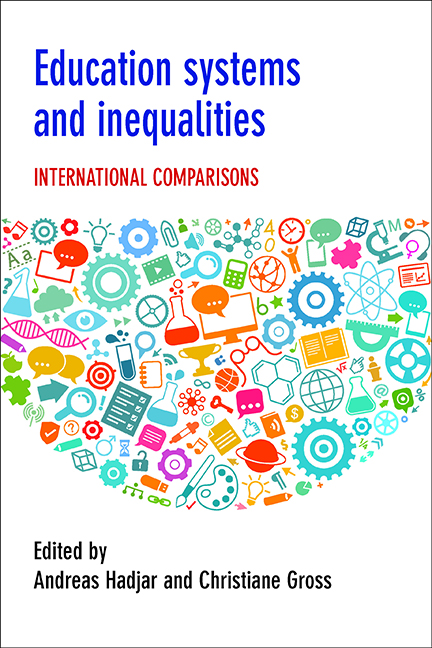Book contents
- Frontmatter
- Contents
- List of tables and figures
- Notes on contributors
- Acknowledgements
- Introduction: education systems and inequalities
- one Theorising the impact of education systems on inequalities
- two Comparing education policies in a globalising world: methodological reflections
- three Education systems and intersectionality
- four Measuring educational institutional diversity: tracking, vocational orientation and standardisation
- five Sorting and (much) more: prior ability, school effects and the impact of ability tracking on educational inequalities in achievement
- six Data analysis techniques to model the effects of education systems on educational inequalities
- seven Education systems and inequality based on social origins: the impact of school expansion and design
- eight Education systems and gender inequalities in educational attainment
- nine Tracking, school entrance requirements and the educational performance of migrant students
- ten From exclusion and segregation to inclusion? Dis/ability-based inequalities in the education systems of Germany and Nigeria
- eleven Education systems and meritocracy: social origin, educational and status attainment
- twelve Education systems and gender inequalities in educational returns
- thirteen Education systems and migrant-specific labour market returns
- fourteen Health returns on education and educational systems
- fifteen Good and bad education systems: is there an ideal?
- Conclusions and summary
- Index
two - Comparing education policies in a globalising world: methodological reflections
Published online by Cambridge University Press: 05 April 2022
- Frontmatter
- Contents
- List of tables and figures
- Notes on contributors
- Acknowledgements
- Introduction: education systems and inequalities
- one Theorising the impact of education systems on inequalities
- two Comparing education policies in a globalising world: methodological reflections
- three Education systems and intersectionality
- four Measuring educational institutional diversity: tracking, vocational orientation and standardisation
- five Sorting and (much) more: prior ability, school effects and the impact of ability tracking on educational inequalities in achievement
- six Data analysis techniques to model the effects of education systems on educational inequalities
- seven Education systems and inequality based on social origins: the impact of school expansion and design
- eight Education systems and gender inequalities in educational attainment
- nine Tracking, school entrance requirements and the educational performance of migrant students
- ten From exclusion and segregation to inclusion? Dis/ability-based inequalities in the education systems of Germany and Nigeria
- eleven Education systems and meritocracy: social origin, educational and status attainment
- twelve Education systems and gender inequalities in educational returns
- thirteen Education systems and migrant-specific labour market returns
- fourteen Health returns on education and educational systems
- fifteen Good and bad education systems: is there an ideal?
- Conclusions and summary
- Index
Summary
Introduction
This chapter explores the methodological challenges in comparing education policies in a globalising world. We begin with the claim that, for the most part, education policies, programmes and practices have been, and continue to be, located in national territorial spaces, although this does not mean the global element is absent. Rather it was possible to detect a ‘thin’ global policy regime in the years following the Second World War until the 1980s. With the advance of neoliberalism as a global political project, there has been a thickening of regional and global policy making activity arising from, and in turn driving, the transformation of national and sub-national education spaces, policies and outcomes. Such transformations have generated important challenges for researchers of education, largely because education policies are no longer primarily ‘national’ or indeed made by national states.
Our aim in this chapter is to sketch the contours of the changes that have taken place in the governance of education systems as a result of global processes, and the challenges this presents us with regard to how we study and compare education policies. We do this by way of four ‘isms’ which we problematise as litmus tests of global educational change. We then raise the question of critical comparison and suggest two conflicting ways that it can be used to study the nature, form and outcomes of education policies. In the final section of the paper we offer three (not exhaustive) methodological reflections – each with a different dimension through which to explore global education processes; ‘time’, ‘space’ and ‘logics of governing’ in education policy making.
‘Isms’
We start by pointing out that, in order to study and compare global education policies, we need to be mindful of the conceptual categories we use – in large part because although the name of a category might remain the same, the meaning of that category (for example state, nation, education, university) may well have changed. We refer to the practice of deploying these same categories without asking questions about the meaning of that category, as methodological ‘isms’ (Robertson and Dale, 2008). The basis of the way we understand and seek to use the term ‘isms’ comes from Herminio Martins (1974), who coined the term ‘methodological nationalism’.
- Type
- Chapter
- Information
- Education Systems and InequalitiesInternational Comparisons, pp. 33 - 50Publisher: Bristol University PressPrint publication year: 2016



